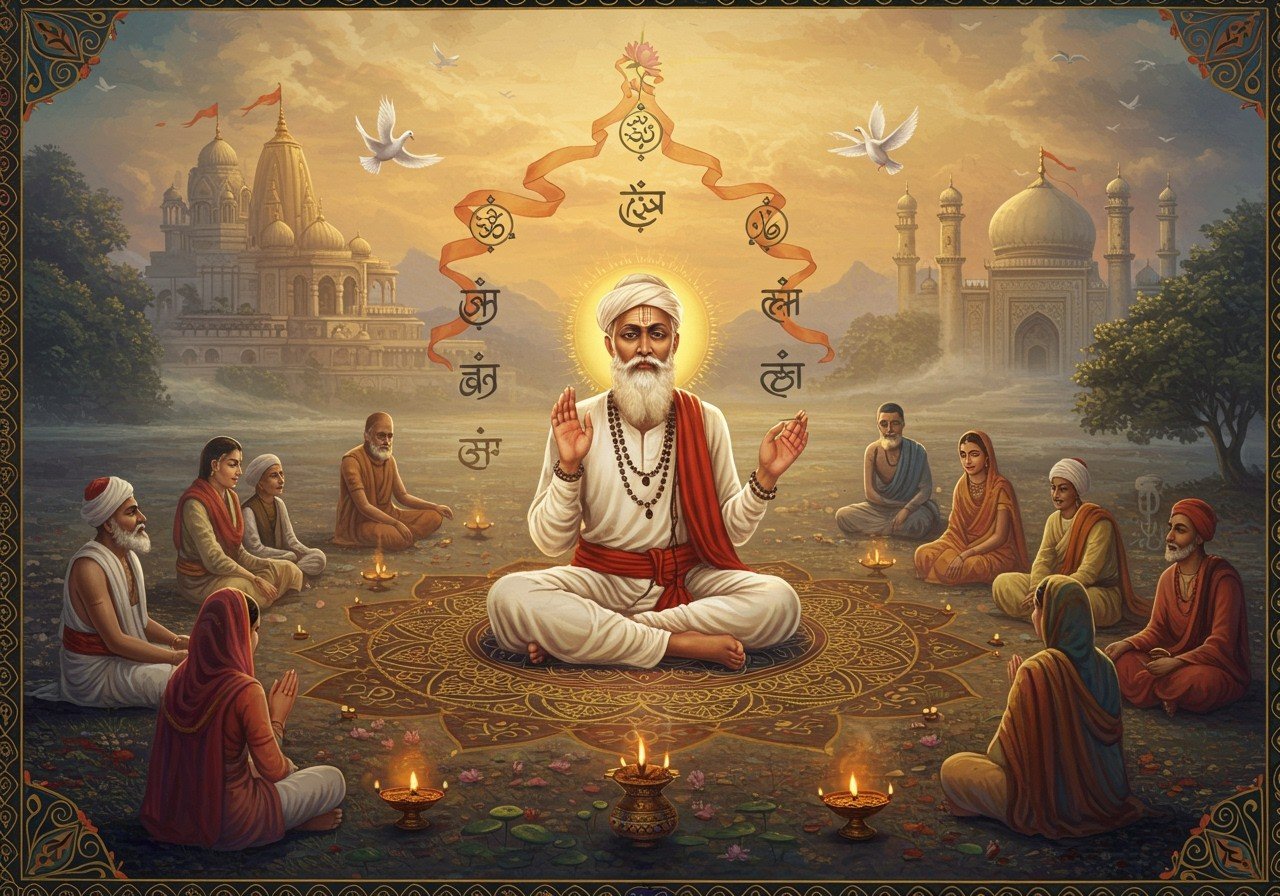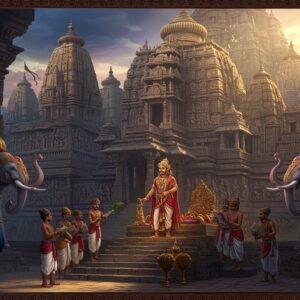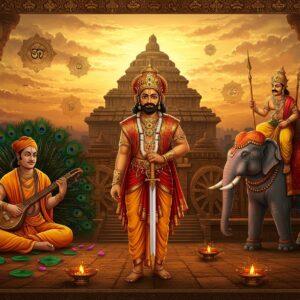
Kabir’s teachings have left an enduring mark on the Bhakti Movement, a spiritual transformation that reshaped Indian society. This movement, emphasizing personal devotion to God, transcended religious rituals and formalities. By exploring its historical background and key figures, we can better grasp the significance of Kabir’s philosophy and its relevance in the modern world.
The Genesis and Growth of the Bhakti Movement
The Bhakti Movement emerged in South India between the 7th and 12th centuries CE, later spreading to North India, gaining momentum in the 15th and 16th centuries. Saints like Ramanuja, Madhvacharya, and Vallabha played crucial roles in its development. The movement centered on love, devotion, and a personal connection with the divine, attracting followers from diverse backgrounds.
This movement challenged the existing social hierarchy of the caste system, promoting equality and inclusivity. As regional languages replaced Sanskrit in devotional practices, spiritual teachings became more accessible to the common people. Recognizing these origins helps us appreciate how the Bhakti Movement influenced social structures and cultural practices across India.
Kabir: The Weaver Saint
Kabir, a humble weaver from Varanasi, stands as one of the most significant figures in the Bhakti Movement. He seamlessly blended Hindu and Muslim traditions, creating a unique spiritual tapestry. Kabir stressed inner spirituality over external rituals, encouraging people to seek a direct experience with the divine.
Kabir’s poetry is filled with simple yet profound metaphors, challenging religious dogma and advocating love and unity. His rejection of religious formalism remains powerful today, reminding us to focus on the true essence of spirituality. You can explore further resources on figures like Kabir at poojn.in.
Kabir’s Impact on Other Bhakti Poets and Movements
Kabir’s teachings inspired numerous Bhakti poets who followed, including Ravidas, Guru Nanak, and Mirabai. These poets integrated Kabir’s ideas into their own works, ensuring the continuation of his teachings through oral traditions.
Kabir’s followers, known as Kabirpanthis, were instrumental in preserving his legacy. His hymns were included in Sikh scriptures like the Guru Granth Sahib, demonstrating his lasting influence. Kabir’s message continues to resonate with those searching for spiritual truth across generations. For those seeking deeper understanding of Bhakti, poojn.in offers valuable insights.
The Social Landscape of Kabir’s Poetry
Living in 15th-century India, Kabir witnessed a society fractured by caste and religion. His poetry aimed to bridge these divides, promoting social reform and unity. He used vernacular language and accessible imagery to make his teachings understandable to all. You can find relevant items for your spiritual practice on poojn.in.
Themes of love, equality, and religious hypocrisy are woven throughout Kabir’s work. He encouraged people to see beyond superficial differences and embrace shared humanity. Kabir’s message still resonates with those working towards social justice and harmony in our time.
Core Principles of Kabir’s Philosophy
Kabir’s philosophy centers on direct experience of the divine. He believed in the oneness of God, rejecting sectarian divisions. Personal devotion, or Bhakti, was the path to spiritual liberation, transcending ritualistic practices.
Kabir stressed self-realization and the discovery of one’s true nature. He taught humility, compassion, and the impermanence of worldly attachments. His teachings encourage followers to prioritize spiritual growth over material pursuits. Explore a wide selection of spiritual items on poojn.in.
How Poojn.in Supports Your Bhakti Journey
Poojn.in offers a variety of items to connect you with the spiritual essence of Kabir and the Bhakti movement. Our collection includes:
- Authentic Prayer Beads (Mala): We offer traditional tulsi and sandalwood malas, ideal for chanting Kabir’s dohas and maintaining a consistent meditation practice. These malas are crafted with care and respect for tradition.
- Sacred Texts: Discover collections of Kabir’s teachings and bhajans, available in both Hindi and English translations. These texts provide valuable insights into his philosophy.
- Pure Cotton Prayer Shawls: Simple, unadorned cotton shawls reflect Kabir’s emphasis on simplicity and purity in devotion. They offer comfort and support during prayer and meditation.
- Brass Diyas: Traditional oil lamps to illuminate your prayer space, symbolizing the Bhakti movement’s focus on personal worship. These diyas create a sacred atmosphere.
- Natural Incense Sticks: Crafted from pure ingredients, these incense sticks help create a serene environment for meditation and prayer. Their gentle fragrance enhances focus and tranquility.
All items on Poojn.in are quality assured and sourced from trusted suppliers who understand the importance of authenticity in spiritual practices. We deliver across India, bringing these sacred items directly to your home. Visit www.poojn.in or contact our customer service for assistance in choosing items that best suit your spiritual practice. Our team understands the significance of these items in Bhakti traditions and can provide expert guidance.
[Note: Product availability and prices may vary. Please check the website for current details.]
Conclusion: Kabir’s Enduring Influence
Kabir’s life and teachings have had a profound and lasting impact on the Bhakti Movement and beyond. His words, filled with wisdom and simplicity, continue to inspire those on a spiritual path. Across centuries, Kabir’s message of love, unity, and equality remains relevant, encouraging us to transcend divisions and embrace shared humanity.
As we reflect on Kabir’s journey, we find guidance in his focus on inner spirituality and direct experience with the divine. His rejection of rigid religious practices encourages us to seek deeper connections with our own spirituality. Kabir’s principles promote self-realization, compassion, and humility—values that resonate deeply in our modern world.
For those exploring spiritual truth, Kabir’s teachings offer a path to personal growth and liberation. His legacy serves as a guiding light for generations seeking meaning and harmony in their lives.
FAQs on Kabir and the Bhakti Movement
What was the central theme of the Bhakti Movement? The Bhakti Movement emphasized devotion to a single God and a personal connection with the divine, moving away from rituals and caste distinctions. It fostered a sense of spiritual equality and direct access to God.
Who was Kabir, and what was his role in the Bhakti Movement? Kabir, a poet and saint, was a pivotal figure in the Bhakti Movement. His poetry challenged traditional practices and promoted unity and love among all people, regardless of background.
How did Kabir’s teachings impact other Bhakti poets? Kabir’s teachings inspired other poets to embrace devotion beyond religious boundaries. His focus on love and equality resonated deeply, leading many to incorporate similar principles into their poetry. This created a ripple effect of spiritual and social reform.
What distinguishes Kabir’s poetry? Kabir’s poetry is unique for its simplicity and profundity. He used everyday language and metaphors to convey complex spiritual and social messages. His direct style challenged established religious norms, making his work accessible and impactful.
Why does Kabir’s work remain relevant today? Kabir’s work remains relevant because it addresses universal themes of love, equality, and unity, which transcend time. His messages encourage harmony and understanding in a diverse world, offering timeless wisdom for contemporary challenges.
How did the social environment shape Kabir’s poetry? Kabir’s poetry was deeply influenced by the social context of his time, marked by religious divisions and caste discrimination. His work sought to bridge these divides by advocating for equality and fostering a sense of shared humanity through devotion.
What are some core principles of the Bhakti Movement inspired by Kabir? Key principles include devotion to a personal God, equality for all, and the rejection of empty rituals in favor of genuine devotion. Kabir’s teachings championed love, harmony, and direct spiritual experience.
How can we appreciate Kabir’s contributions to the Bhakti Movement in the present day? We can appreciate Kabir’s legacy by reading his poetry, understanding his message of love and unity, and applying these principles in our daily lives to promote harmony and understanding. His teachings offer timeless wisdom for navigating the complexities of the modern world.


